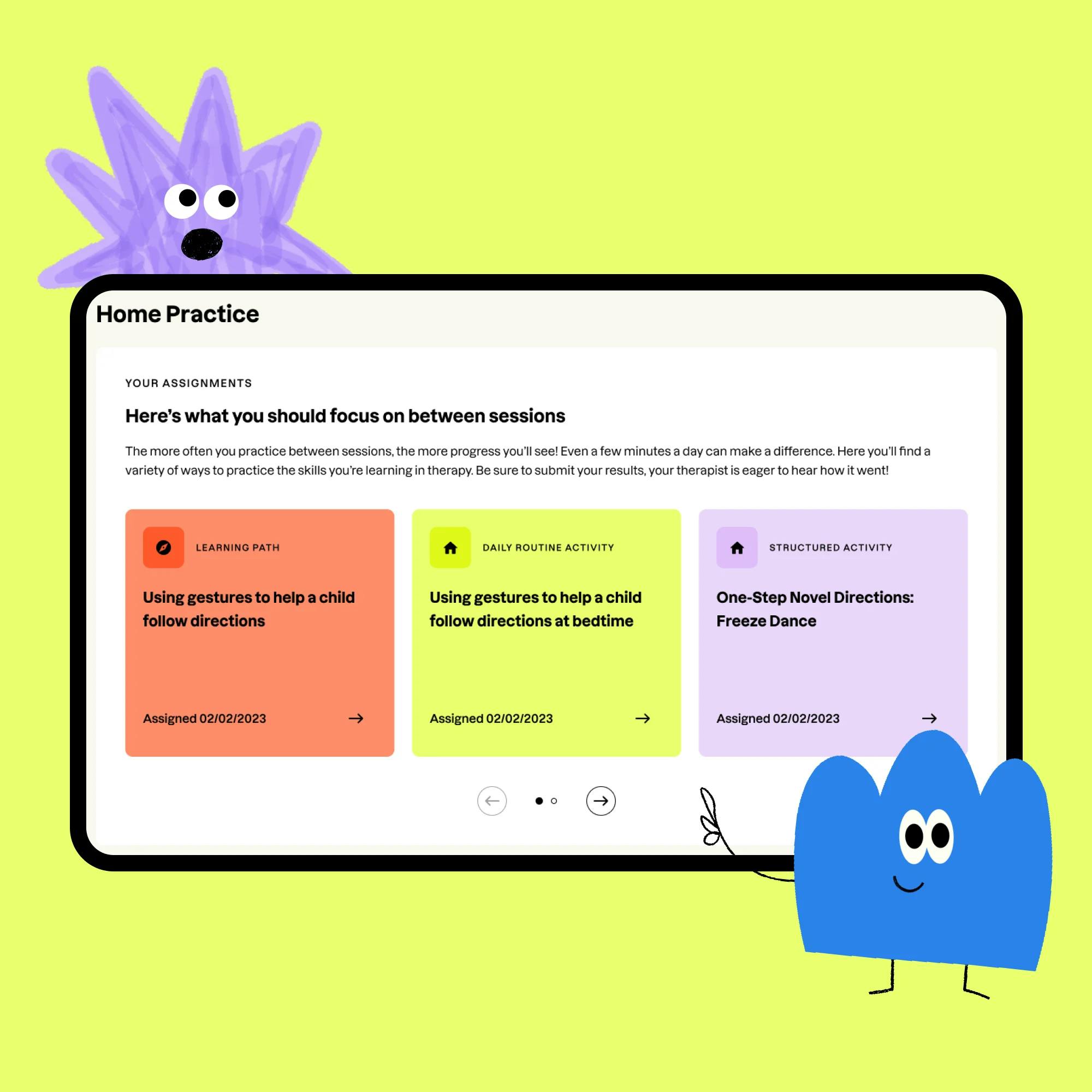When it comes to making progress in speech therapy, the frequency of sessions can make a big difference. That’s because the more often you reinforce and practice the skills you’re learning, the more quickly you’ll master them–and move on to the next ones. This can help you reach your goals faster, graduate from therapy sooner, and potentially save money in the long run!
Looking for a speech therapist?
We offer personalized, 1-on-1 sessions at a time that fits your schedule. Get matched with a speech therapist today.
 Get started
Get startedHow many days a week should a child or adult have speech therapy?
How often should a person go to speech therapy? The frequency of sessions is based on the clinical recommendation of a speech-language pathologist, also known as a speech therapist. In many cases, your speech therapist will recommend having sessions twice a week, at least to start.
Developing speech and language skills takes practice and repetition. Ultimately, the more often you’re reinforcing these skills, the faster you’ll graduate from speech therapy. You’ll achieve your goals more quickly, and you’ll likely save time and money in the long run.
Ultimately, the more often you’re reinforcing these skills, the faster you’ll graduate from speech therapy.
You may wonder, is speech therapy once a week enough? In some situations, it may be. However, attending therapy sessions more often helps you learn new techniques, build and reinforce new skills, and learn how to practice on your own.
As you make progress, it’s common for your speech therapist to then reduce session frequency. However, in some cases, your speech therapist might recommend increasing how often you have sessions. For some people, this is needed in order to make better progress or capitalize on their momentum.
How long will speech therapy take?
This is a common question, but there’s no one-size-fits-all answer. A big key to progress–and how soon a person graduates from speech therapy–is home practice.
At the end of the day, learning speech and language is like learning any other skill–cooking, the violin, baseball. Think about it: If you only practice batting or throwing once a week, you'll eventually become a better baseball player. But if you practice several days a week, even for small amounts of time, you'll be much more likely to make the varsity team–and sooner.
The same principles apply to speech therapy! More frequent sessions, along with regular home practice, increases repetition and the amount of input you or your child receive. This helps you make faster progress toward your communication goals.


How is speech therapy frequency determined?
Your speech therapist’s clinical recommendation for the frequency of sessions is based on a speech and language evaluation. The purpose of an evaluation is to determine if a person needs speech therapy, and if so, what kind and how often.
What happens during a speech evaluation?
The evaluation is conducted by a speech-language pathologist. It consists of tests and assessments focused on the areas of communication that you’re concerned about. The speech therapist may choose other related tests as well. The tests are geared toward the person’s age, whether they’re a toddler, preschooler, school-aged child, teen, or adult.
For example, a speech therapist may select an articulation assessment, such as the Goldman-Fristoe Test of Articulation (GFTA), 3rd Edition, for someone who is having trouble with the clarity of their speech. This test can be performed with very young children all the way up through adults. It assesses a person's ability to produce all the different sounds in speech.
The Clinical Evaluation of Language Fundamentals, 5th edition, and the Clinical Evaluation of Language Fundamentals: Preschool, 3rd edition, are tests aimed at children who have trouble understanding what others say to them or expressing what they want to say. If your toddler or young child isn’t talking at an age-expected level, this test may be used during the evaluation.
No matter which tests are used, the speech therapist observes the person’s responses and scores the tests. However, it’s important to know that these scores are just one part of the evaluation. The speech therapist will evaluate the person holistically as they speak and interact with them. They will also determine the extent to which the communication concerns affect the person’s confidence and participation at work, at school, or socially.
For children, the therapist will talk with the parent or caregiver in order to get a well-rounded assessment of the child’s current abilities. And before the evaluation, you’ll likely fill out a questionnaire covering medical and birth history.
What happens after a speech evaluation?
If speech therapy is recommended, the therapist will explain how often you or your child should attend speech therapy sessions. For most of Expressable’s clients, the clinical recommendation is twice a week. Some clients with more complex needs may require speech therapy more than two times per week.
In making this recommendation, the speech therapist will also consider factors such as the client's insurance coverage and the amount of time they have available for therapy.
The purpose of a speech evaluation is also for the speech therapist to determine the starting point for therapy. Observing a person’s communication strengths and opportunities to improve helps the speech therapist know what goals to set for their therapy.
Speech therapy goals are written to be measurable and specific. Measuring a person’s success against a goal allows the speech therapist to keep track of that person’s progress. And keeping goals specific to the individual person helps ensure that what they’re working on exactly fits their needs.
Scheduling your speech therapy sessions
Finally, you’ll work with your speech therapist to schedule your sessions. This is where online speech therapy is especially helpful. You can attend sessions at home–no need to commute to a clinic. And many online speech therapists offer convenient hours, including after school, evenings, and weekends.
We know family life is busy, with work, school, sports, lessons, and other commitments. Online speech therapy makes it easier to attend sessions at the frequency that’s recommended by your therapist–so you can reach your goals sooner.
How Expressable Can Help
Concerned your child isn't reaching age-expected milestones? Looking for communication support from a professional? Expressable is a national online speech therapy practice serving children and adults. We treat all major areas of communication and feeding, offer flexible hours including evenings and weekends, and accept most major health insurance plans. We’re proud to have earned more than 3,000 5-star reviews from our clients (4.9/5 average).
Our therapy model is centered on parent and caregiver involvement. Research proves that empowering caregivers to participate in their loved one’s therapy leads to better outcomes. That’s why we combine live, 1-on-1 speech therapy with personalized education and home practice activities for faster progress.
Communication is more than words. It’s how we share how we feel and show who we are. We’re here to help you or your child do just that.

 Leanne Sherred, M.S., CCC-SLP
Leanne Sherred, M.S., CCC-SLP












